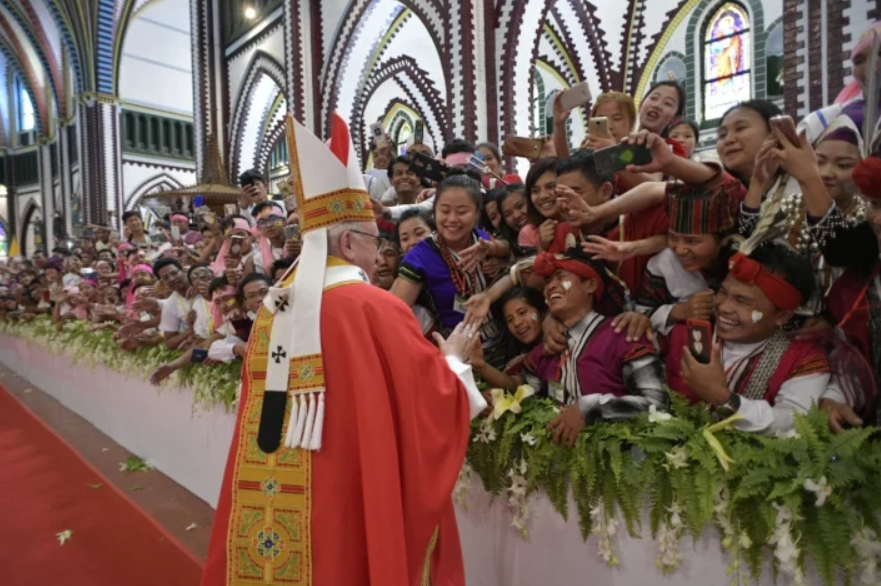A missionary named Francis
Proclaiming the Gospel was his top priority: he reminded us that mission is about joy, that its territories are not defined by geography or people's religious affiliation. Through his life and teaching, he taught us that Jesus' missionaries do not ask themselves how to get others to follow them, but how they can reach others.
Pope Francis was a missionary pope: in the 12 years of his pontificate, he visited 66 countries around the world, as well as some 50 locations in Italy. This was quite a tall task, given his advanced age and fragile health.
The pope's destinations eloquently describe the fundamental choices of his pontificate since 8 July 2013, when he visited the island of Lampedusa, declaring to the world his marked attention to the tragedy of migration and his protest and sorrow at the massacres in the Mediterranean.
The Pope has engaged in dialogue with China, reaching a historic agreement; he has met Putin and Patriarch Kirill of Moscow. But Francis has not at all favoured the nations at the centre of humanity's strategic dynamics.
On the contrary, he has drawn attention to countries, ecclesial communities, wars and conflicts on the margins of the great debates and media narratives.
The Pope has wanted to show – and has succeeded in doing so – that there are no countries or peoples that are more or less important, and that their dignity is not measured by the size of their population or their economic or political influence.
The Pope has been to East Timor, Myanmar, Bangladesh, Singapore, Mongolia, Sri Lanka, Papua New Guinea, South Sudan, Mauritius, the Central African Republic, the Democratic Republic of Congo and many others, and, as mentioned above, to many other places that are of 'no interest' to those who judge world events in terms of power and markets.
Proclaiming the Gospel has been his top priority: and mission is not measured in terms of worldly success or the acquisition of a religious majority, but in terms of the quality of evangelical witness. It seems to me that the Pope has refined an evangelical view of reality: the logic of the Beatitudes overturns and subverts the worldly one.
The Pope has often criticised proselytism, a bad by-product of missionary activity, which relies on human means and persuasion to convince others to join our group. In no way did the Pope intend to diminish the validity of the missionary mandate, as some have wanted to understand.
Conversely mission is not human work, and Francis has rethought it from its origins: it comes from God and the protagonist is the Spirit of Jesus. This insight is important because for a long time mission has been nourished by a worldly and inadequate theological thinking, enjoying with satisfaction accounting and gratifying successes.
How truly evangelical were the religious conquests achieved from positions of power and superiority, with strategies of colonial expansion? The logic of the Gospel, on the other hand, trusts in the meaning of small, fragile and hidden things, because this is how the grace of Jesus is manifested.
Contrary to proselytism, Francis reiterated, the mission spreads by attraction. In other words, it is Jesus who attracts people to himself, and it is the genuine evangelical witness of his disciples that attracts people.
If the mission is a gift from God, if it is the oxygen of Christian life, then its content is also profoundly renewed in Francis' teaching. Mission has to do with joy; it is good news that brings happiness and beauty. The Joy of the Gospel is the title of his first apostolic exhortation, the programme and Magna Carta of his pontificate.
The Gospel is something beautiful and brings happiness to people's lives. Christian communities and disciples who display sadness, disappointment, discouragement and boredom will never be able to attract anyone to Jesus.
The preaching of the Gospel cannot be fuelled by opposition to other faiths, fear of God and others, or rely on doctrines that threaten punishment, fuelling guilt, frustration and the desire to rebel.
We must be happy to be disciples of Jesus and missionaries of his Gospel! The Pope has restarted Christian life and mission from the theme of joy, the sentiment announced on Christmas night and Easter morning.
Together with the origin and content, the Pope showed that the places of mission are not defined by geography or the religious affiliation of people.
These new places were described with effective and eloquent images: ‘Outward moving Church’, ‘field hospital’, ‘peripheries’... If I understand Pope Francis correctly, mission is not so much about bringing more people to church as it is about pushing the people of the Church towards the places where the women and men of today meet, offering them solidarity, help and care.
Jesus' missionaries do not ask themselves how to get others to follow them, but how they can reach them.
The image of the field hospital is particularly striking in this period full of wars, wounded people and wounds to be healed: the mission reaches out to the tragedies of the men and women of our time.
It is there that missionary disciples realise the Gospel of peace and freedom, mercy and care, in imitation of Jesus, the Good Samaritan.
On the evening he presented himself to the world, Pope Francis described the country he came from, Argentina, as being located ‘almost at the end of the world.’
But he himself showed us that no country is at the end of the world. For those who look at humanity with the same gaze as Jesus, no place and no person is too far away.
07/02/2019 17:28







.png)










